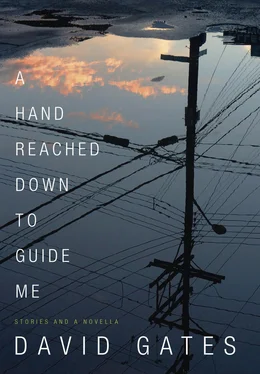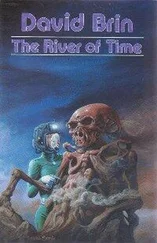—
I’d been to Rio, Amsterdam, St. Kitts and wherever else a snotty Yale girl goes, as well as France and Peru with my first husband, but I’d never seen what you might call America: just New York, L.A., San Francisco, Washington, D.C., and Colonial Williamsburg. So for our honeymoon, which he called a wedding trip, we’d driven in his truck (and thank God for four-wheel drive) across days of increasingly desolate late-winter landscape, staying in grimmer and grimmer motels, until the Rocky Mountains appeared and we were in Montana, at a turn-of-the-century hot spring resort where I suspect he’d gone with his first wife. By day we skied trails in Yellowstone, just over the state line into Wyoming, and saw as many elk as a pair of newlyweds could wish for; by night we drank whiskey out of plastic cups while floating in water the temperature of our bodies, with snow falling on us. On the way back, we took a detour from Rapid City down to Mount Rushmore—“Would you mind indulging me?”—and he pointed above and beyond the presidents’ heads, which were smaller than I’d expected, to where James Mason’s North by Northwest house would have stood. “As you can see,” he said, “it couldn’t possibly have been there.”
“Whoever thought it could?” I said.
“Nobody,” he said. “I’ve probably seen too many movies.”
Mud season had set in by the time we got back, but he couldn’t wait to bring me up to his hilltop. He put the truck in four-wheel low, and we fishtailed up a dirt track, mud and snow and pebbles rattling under the floorboards. At the top, he got out, came around and helped me down, and we looked across the river at a rugged gray mountain on the other side. “What do you think?” he said.
I pulled the hood of my parka over my head against the cold wind and put my hands in my pockets. “It’s impressive that you own all this,” I said.
“Do you think you could live here?”
“It’s a little short on amenities,” I said.
“Amenities we can do,” he said. “Just draw up the plans and add money. You don’t want to live in a Charles Addams house the rest of your life. Hell, even the rest of my life.”
“I like your house.”
“You’ll like this better, trust me. I’ll show you what I’ve got, and we can fine-tune it together.”
“Can we get back in the truck?” I said.
He put an arm around my shoulders. “Come on.”
As we inched down the hill, heater blasting, I said, “You’ve wanted this a long time.”
“All my life.” He put on his old-timer voice. “ Not yet .”
—
They began excavating on the hilltop as soon as they could get their machines up the track, and by late April they’d poured the foundation, dug for the septic and the drainage field and started drilling the well. Next year at this time, he said, we’d be in there. He’d sat me down in his workroom to go over the plans with me, and what he’d designed turned out to be more or less the James Mason house, right down to the triangular braces under what I would have called the deck.
“Of course Wright would never have used those,” he said. “You’ve seen Fallingwater.”
“You don’t mean Niagara ?” I said. “That’s not Hitchcock.”
“Dear God,” he said. He jumped up and went to the bookshelf.
His plan seemed fine, what did I know. Flat roof, two stories and a basement, balcony all around the inside, looking down into the living room, with rooms off it, something like the high-end motel where we’d stayed outside Chicago—a Radisson or something, with a pool down in the atrium—which of course I didn’t say. Workroom for him, workroom for me, wall of windows facing west.
“For me to die in and you to inherit,” he said. “We’ll call it Viduity Manor.”
“I’m getting sick of this motif,” I said. “Maybe you should give it a rest?”
“Eventually, of course. Why do you think I’m running it into the ground?” He shook his head. “Maybe that’s not the happiest metaphor.”
—
I met my new husband’s old wife at an opening—mobiles by a woman who’d been a friend of theirs—somewhere in the borderland of Chelsea and Hell’s Kitchen. He was in what you might call rare form, if it had been rare, most of the way down the Taconic—“Hellsea! Do I have a genius for marketing?”—but on the West Side Highway he gave the finger to a driver who cut us off, which I’d never seen him do; now I realize that he knew she’d be there. He asked me what I’d like from the bar, then started pushing through the crowd. A wiry middle-aged woman in black jeans and a black silk top, her short black hair moussed up into flames, came over to me. “Quite the wingding,” she said. “I know who you are.”
“I’m afraid you’ve got the advantage.” But of course I knew.
“I used to,” she said. “You’re lovely. You should last him the rest of the way. I see he’s in no hurry to get over here.” I looked toward the bar in time to catch him turning away. “One can hardly blame him. How’s life in Lord Weary’s Castle?”
“We’re doing well,” I said. “Thanks for asking.”
“So you’re feisty too. You’ll need to be. Oh dear, am I being the bad fairy at the wedding? I do like him, still. But I think he’s a task for younger strengths.”
“He always speaks well of you.”
“Aren’t you sweet to say so.” She looked over again. “I think he’s nerved himself up to face the music. If you’ll excuse me, I need to congratulate the belle of the ball.”
He shouldered himself between a young man with a tattooed neck and a drag queen with a lorgnette and handed me a glass of white wine, some of which had spilled onto his wrist. “How was that ?” he said.
“It was fine. She doesn’t seem to bear you any ill will.”
“Well, good,” he said. “I hope that doesn’t mean her memory’s going.”
“She reminded me of you. The way she talks.”
“I suppose. We were together twenty-eight years. Twenty-seven.”
“Was she the love of your life?” I said.
“Life is long,” he said. “As you’ll see.”
—
The tree outside my window had leafed out when the daughter flew east to stay with her mother for a few days, then took the train up to spend a night and, presumably, to check out the new wife. I went with him to the station; probably I should have let them have time alone, but I wanted to be welcoming and he seemed grateful for a buffer. She was waiting outside with her bag: a slender girl, tall like her father, pale, with glaring red lipstick and straight black hair, a leotard under her long skirt. His truck had one of those extended cabs, and she insisted on climbing into the cramped seat in the back, sitting sideways, knees up, with her high-tops on the cushion.
“You’re older than I thought,” she said to me.
“Is that a good thing or a bad thing?”
“I don’t know,” she said. “I’m making conversation.”
“You used to be a little more adept at it than that ,” her father said.
“Well, we’re not so civilized out in Portland. It’s like, PBR and the Ducks.”
“Is that a rock band?” he said.
“Are you trying to be funny?” she said. “PBR?”
“Your father says you play in a band,” I said.
“I’m a fucking waitress.”
“For now,” he said to me. “But her band has been—”
“It’s not a band ,” she said.
“I thought you didn’t like ‘ensemble,’ ” he said.
“Can I try?” I looked back at her. “Listen, you don’t want a stepmother and I don’t want to be one. Maybe you and I can just—”
Читать дальше











